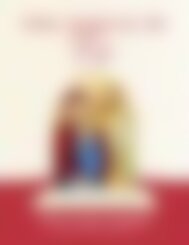Magis Parish Edition - Participant Guide Sample
You also want an ePaper? Increase the reach of your titles
YUMPU automatically turns print PDFs into web optimized ePapers that Google loves.
PARISH EDITION<br />
The<br />
Catholic Faith<br />
AND Science<br />
-------------------------------------- PARTICIPANT GUIDE -------------------------------------<br />
ROBERT SPITZER S.J., PH.D.
EPISODE 1<br />
Medical<br />
Evidence of Our<br />
Transphysical<br />
Soul<br />
2
Episode 1 Overview<br />
Scan to Watch<br />
the Episode<br />
Near-death experiences are episodes where people undergo clinical death and<br />
then return to physical life, some reporting afterwards that they maintained<br />
consciousness. The very topic of near-death experiences (NDEs) must be approached<br />
with caution. There is a lot of unscientific writing about near-death experiences,<br />
often based on nothing but anecdotes, which is sometimes focused on<br />
the writers’ own agendas rather than evidence.<br />
However, there is also a growing body of legitimate research — actual medical<br />
studies published in peer-reviewed scientific journals — on the subject of NDEs.<br />
Before we look at some of these studies, we must consider what is meant by<br />
“near-death experiences.”<br />
In this Episode you will learn that …<br />
■ We can learn about our eternal destiny from revelation as well as natural science.<br />
■ Our consciousness cannot be reduced to the brain, and has a transphysical component.<br />
■ Scientific studies on near-death experiences (NDEs) and terminal lucidity provide evidence of survival of<br />
human consciousness after clinical death.<br />
■ Scientific studies complement Church teaching when it comes to understanding life after death.<br />
Connections to the Catechism<br />
■ CCC 1016-1017<br />
■ CCC 1052<br />
© Sophia Institute for Teachers<br />
3
Episode 1 Notes<br />
____________________________________________________________________________________________<br />
____________________________________________________________________________________________<br />
____________________________________________________________________________________________<br />
____________________________________________________________________________________________<br />
____________________________________________________________________________________________<br />
____________________________________________________________________________________________<br />
____________________________________________________________________________________________<br />
____________________________________________________________________________________________<br />
____________________________________________________________________________________________<br />
____________________________________________________________________________________________<br />
____________________________________________________________________________________________<br />
____________________________________________________________________________________________<br />
____________________________________________________________________________________________<br />
____________________________________________________________________________________________<br />
____________________________________________________________________________________________<br />
____________________________________________________________________________________________<br />
____________________________________________________________________________________________<br />
____________________________________________________________________________________________<br />
____________________________________________________________________________________________<br />
____________________________________________________________________________________________<br />
____________________________________________________________________________________________<br />
____________________________________________________________________________________________<br />
____________________________________________________________________________________________<br />
____________________________________________________________________________________________<br />
____________________________________________________________________________________________<br />
____________________________________________________________________________________________<br />
____________________________________________________________________________________________<br />
4 Apologetics I: The Catholic Faith and Science<br />
© <strong>Magis</strong> Center
Discussion and Reflection Questions<br />
1 Had you heard of near-death experiences before watching this Episode? If so, how did the Episode<br />
add to your understanding of them?<br />
_<br />
_<br />
_<br />
2 What did you find most interesting in this Episode? Thinking of the young people in your life what do<br />
you think they would find most interesting?<br />
_<br />
_<br />
_<br />
3 Fr. Spitzer mentioned that some hydrocephalus patients exhibit “genius level IQ” despite the fact<br />
that their brains have sustained major damage. What does this suggest about the relationship<br />
between consciousness and the body?<br />
_<br />
_<br />
_<br />
4 If you were talking to a young person in your life and they had heard of near-death experiences, but<br />
thought they were simply imagined by patients, how could you respond?<br />
_<br />
_<br />
_<br />
5 In terms of apologetics [the defense of the Catholic faith], what is the significance of the types of<br />
sources reporting on near-death experiences? How can you use what you learned in this episode<br />
with the young people in your life?<br />
_<br />
_<br />
_<br />
© Sophia Institute for Teachers<br />
Episode 1: Medical Evidence of Our Transphysical Soul<br />
5
EPISODE 9<br />
Science and the<br />
Shroud of Turin<br />
34
Episode 9 Overview<br />
Scan to Watch<br />
the Episode<br />
The Shroud of Turin is a burial cloth that bears the image of a crucified man. This<br />
image matches perfectly the description of the wounds Christ suffered during<br />
His Crucifixion. Modern science has shown the image to be anatomically accurate<br />
and that it could not have been produced by any kind of paint, dye, chemical,<br />
vapor, or scorching. Recent tests have dated the shroud to the time of Christ and<br />
have placed its origin near the Sea of Galilee. All the evidence suggest that the<br />
Shroud of Turin is the burial cloth of Christ mentioned in the Gospels and that it<br />
bears a miraculous image of the moment of Jesus’ Resurrection. This precious<br />
relic is powerful testimony to our faith in Christ, the historicity of His Resurrection,<br />
and His claims to be divine.<br />
In this Episode you will learn that …<br />
■ We can learn about our eternal destiny from revelation as well as natural science.<br />
■ Our consciousness cannot be reduced to the brain, and has a transphysical component.<br />
■ Scientific studies on near-death experiences (NDEs) and terminal lucidity provide evidence of survival of<br />
human consciousness after clinical death.<br />
■ Scientific studies complement Church teaching when it comes to understanding life after death.<br />
Connections to the Catechism<br />
■ CCC 606–630<br />
■ CCC 638–640<br />
■ CCC 651–655<br />
© Sophia Institute for Teachers<br />
35
Episode 9 Notes<br />
____________________________________________________________________________________________<br />
____________________________________________________________________________________________<br />
____________________________________________________________________________________________<br />
____________________________________________________________________________________________<br />
____________________________________________________________________________________________<br />
____________________________________________________________________________________________<br />
____________________________________________________________________________________________<br />
____________________________________________________________________________________________<br />
____________________________________________________________________________________________<br />
____________________________________________________________________________________________<br />
____________________________________________________________________________________________<br />
____________________________________________________________________________________________<br />
____________________________________________________________________________________________<br />
____________________________________________________________________________________________<br />
____________________________________________________________________________________________<br />
____________________________________________________________________________________________<br />
____________________________________________________________________________________________<br />
____________________________________________________________________________________________<br />
____________________________________________________________________________________________<br />
____________________________________________________________________________________________<br />
____________________________________________________________________________________________<br />
____________________________________________________________________________________________<br />
____________________________________________________________________________________________<br />
____________________________________________________________________________________________<br />
____________________________________________________________________________________________<br />
____________________________________________________________________________________________<br />
____________________________________________________________________________________________<br />
36 Apologetics I: The Catholic Faith and Science<br />
© <strong>Magis</strong> Center
Discussion and Reflection Questions<br />
1 What, if anything, had you known about the Shroud before watching this Episode?<br />
_<br />
_<br />
_<br />
2 What point(s) about the Shroud of Turin stuck with you the most?<br />
_<br />
_<br />
_<br />
3 How do we know the stains on the Shroud are blood, and furthermore human blood?<br />
_<br />
_<br />
_<br />
4 Think of how you could share what you’ve learned about the Shroud with young people in your life.<br />
How would you explain the particle radiation hypothesis concerning the image on the Shroud, and/<br />
or any other part of the Episode you found compelling?<br />
_<br />
_<br />
_<br />
_<br />
_<br />
_<br />
5 Why do you think God gave us relics such as the Shroud which provide evidence of supernatural<br />
occurrences?<br />
_<br />
_<br />
_<br />
© Sophia Institute for Teachers<br />
Episode 9: Science and the Shroud of Turin<br />
37
EPISODE 19<br />
Why Would an<br />
All-Loving God<br />
Allow Suffering?<br />
74
Episode 19 Overview<br />
Scan to Watch<br />
the Episode<br />
Imagine a world in which being selfish, arrogant, or hurtful towards others was not<br />
a possibility. Everyone was forced to be perfectly loving all the time. It might seem<br />
like this situation would be great, but would it, really? If someone is not free to<br />
make any other choice, have they really chosen love? For love to really be love, it<br />
must be freely chosen. A person who can love must therefore be free to choose<br />
against it. Those choices inevitably result in suffering. Thankfully, we know as<br />
Christians that God has an infinite ability to transform bad into good. We can know<br />
that He provides us many paths to transform the suffering we experience into<br />
even greater joys, if we trust in Him and allow Him to guide us. We will explore what<br />
that means in this chapter.<br />
In this Episode you will learn that …<br />
■ The Resurrection of Jesus and the suffering He endured for our sake perfectly reveals God’s<br />
unconditional love for us.<br />
■ Jesus Christ has changed the meaning of suffering – we now have the ability to offer up our own<br />
suffering for the good of others.<br />
■ There will be no suffering in our own resurrection.<br />
■ Suffering is not only experienced by the unjust and it is not solely the result of Original Sin.<br />
Connections to the Catechism<br />
■ CCC 301<br />
■ CCC 601<br />
■ CCC 1804<br />
■ CCC 2015<br />
© Sophia Institute for Teachers<br />
75
Episode 19 Notes<br />
____________________________________________________________________________________________<br />
____________________________________________________________________________________________<br />
____________________________________________________________________________________________<br />
____________________________________________________________________________________________<br />
____________________________________________________________________________________________<br />
____________________________________________________________________________________________<br />
____________________________________________________________________________________________<br />
____________________________________________________________________________________________<br />
____________________________________________________________________________________________<br />
____________________________________________________________________________________________<br />
____________________________________________________________________________________________<br />
____________________________________________________________________________________________<br />
____________________________________________________________________________________________<br />
____________________________________________________________________________________________<br />
____________________________________________________________________________________________<br />
____________________________________________________________________________________________<br />
____________________________________________________________________________________________<br />
____________________________________________________________________________________________<br />
____________________________________________________________________________________________<br />
____________________________________________________________________________________________<br />
____________________________________________________________________________________________<br />
____________________________________________________________________________________________<br />
____________________________________________________________________________________________<br />
____________________________________________________________________________________________<br />
____________________________________________________________________________________________<br />
____________________________________________________________________________________________<br />
____________________________________________________________________________________________<br />
76 Apologetics I: The Catholic Faith and Science<br />
© <strong>Magis</strong> Center
Discussion and Reflection Questions<br />
1 Fr. Spitzer described the chain of reasoning that leads some to conclude that suffering disproves<br />
the existence of an all-powerful and all-loving God. How you would put that reasoning into your own<br />
words?<br />
_<br />
_<br />
_<br />
2 Father Spitzer called something about this chain of reasoning “dead wrong” – what is the error, and<br />
why is the correct understanding of suffering important for helping others overcome doubt about<br />
God’s existence?<br />
_<br />
_<br />
_<br />
3 What is the connection between suffering and freedom?<br />
_<br />
_<br />
_<br />
4 Have there been times in your life when difficult circumstances brought out strength and virtue you<br />
did not know you had? How so?<br />
_<br />
_<br />
_<br />
5 Fr. Spitzer shared some of the good things that can come from suffering (especially suffering from<br />
self-destructive paths). Thinking back on your own life, are there any parts of your story you can use<br />
to share God’s love with others?<br />
_<br />
_<br />
_<br />
© Sophia Institute for Teachers<br />
Episode 19: Why Would an All-Loving God Allow Suffering?<br />
77
















